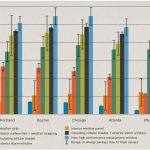“Metrics on resource productivity currently used by governments suggest that some developed countries have increased the use of natural resources at a slower rate than economic growth (relative decoupling) or have even managed to use fewer resources over time (absolute decoupling). Using the material footprint (MF), a consumption-based indicator of resource use, we find the contrary: Achievements in decoupling in advanced economies are smaller than reported or even nonexistent.”
“By calculating raw material equivalents of international trade, we demonstrate that countries’ use of nondomestic resources is, on average, about threefold larger than the physical quantity of traded goods. As wealth grows, countries tend to reduce their domestic portion of materials extraction through international trade, whereas the overall mass of material consumption generally increases.”
“Our findings call into question the sole use of current resource productivity indicators in policy making and suggest the necessity of an additional focus on consumption-based accounting for natural resource use.”
Read more: The material footprint of nations, Thomas O. Wiedmann, Heinz Schandl, Manfred Lenzen, Daniel Moran, Sangwon Suh, James West, and Keiichiro Kanemoto, in PNAS 2013. Open Access. Via Klimaatblog.





